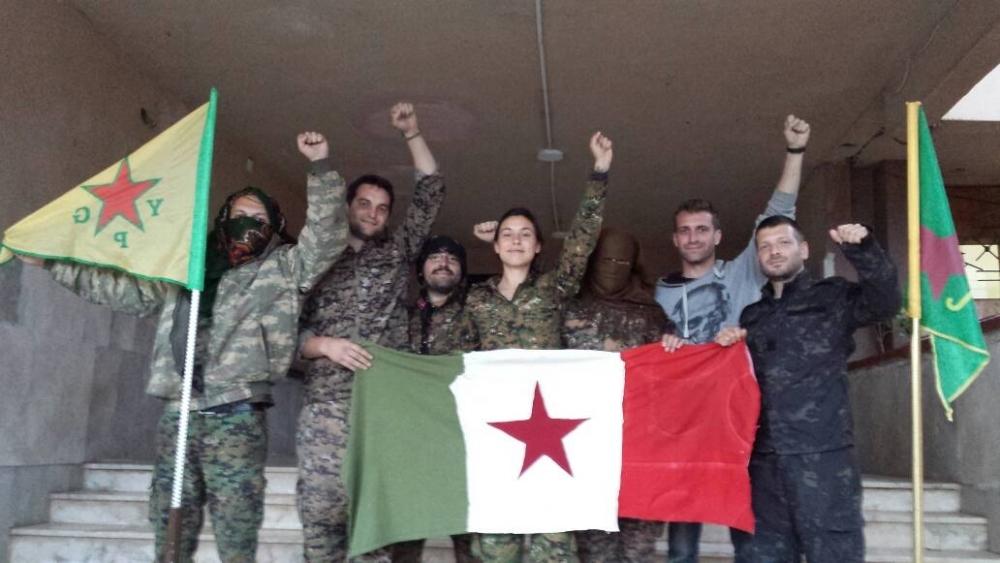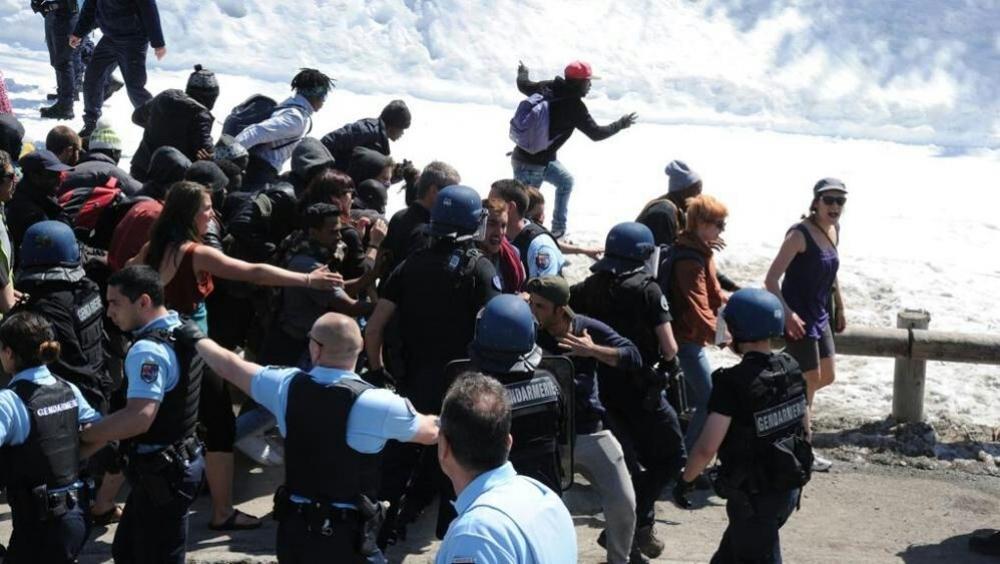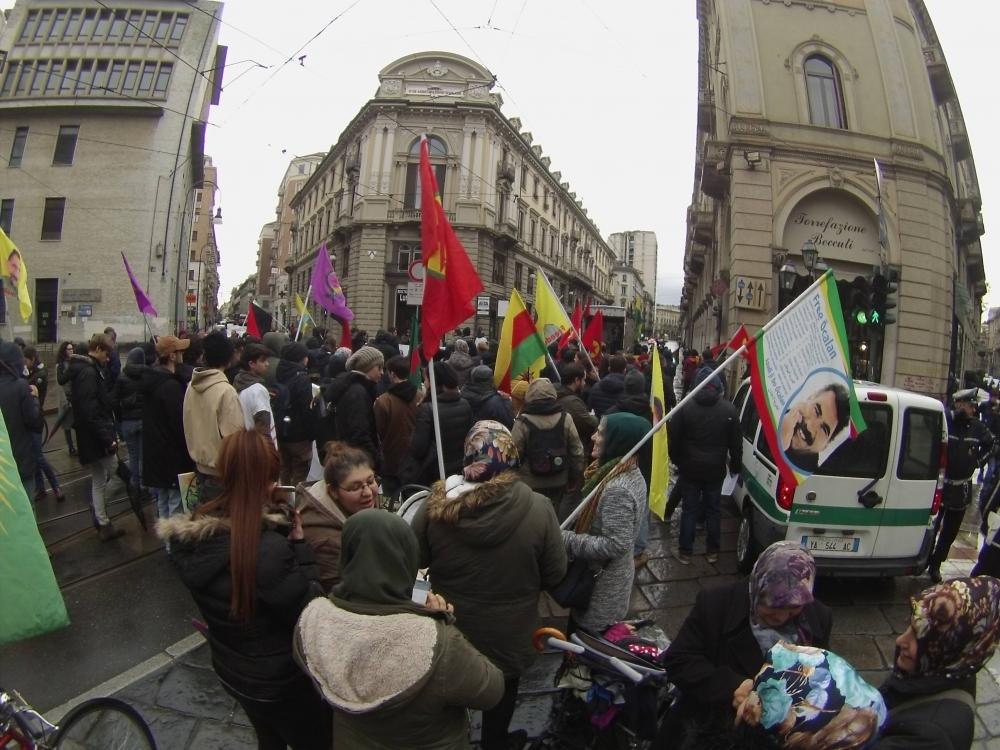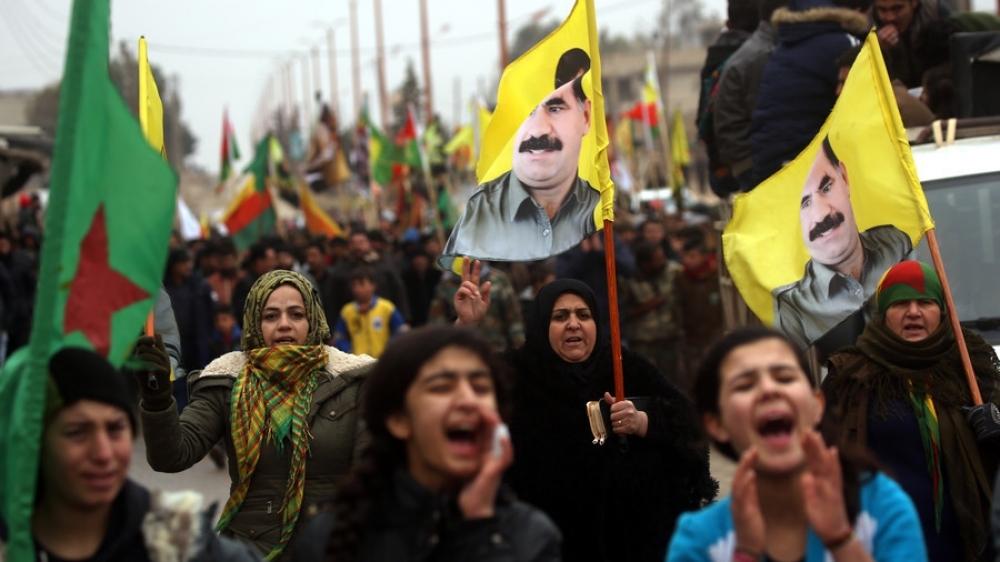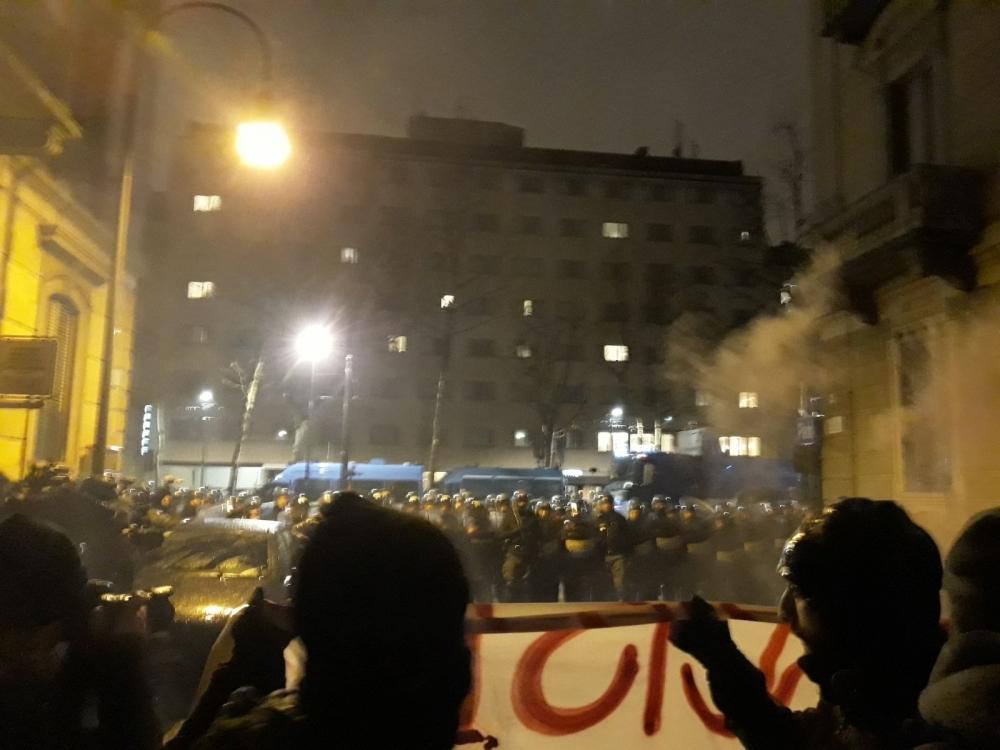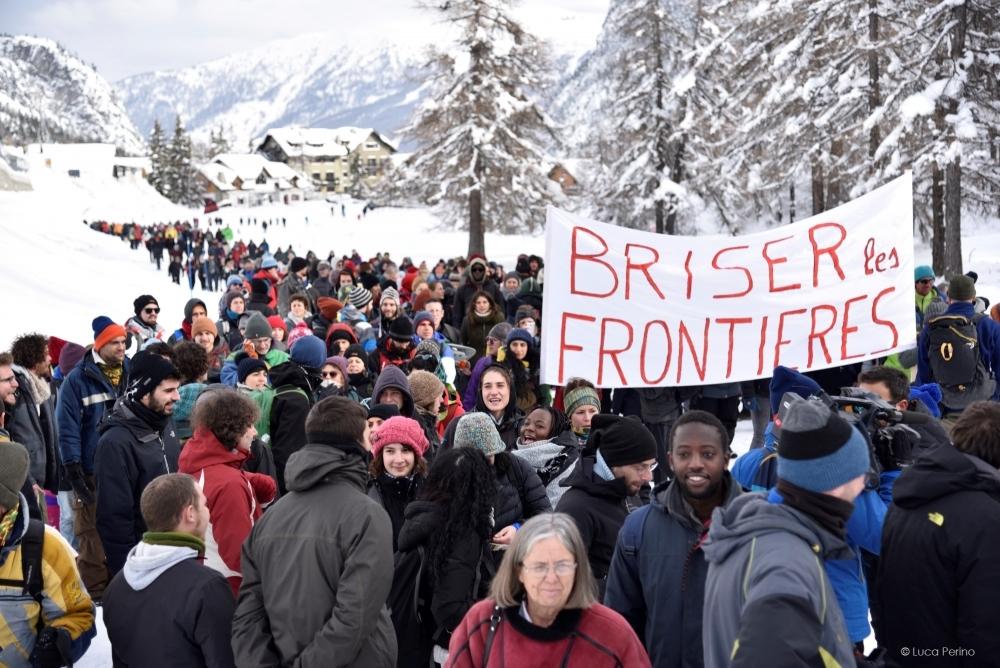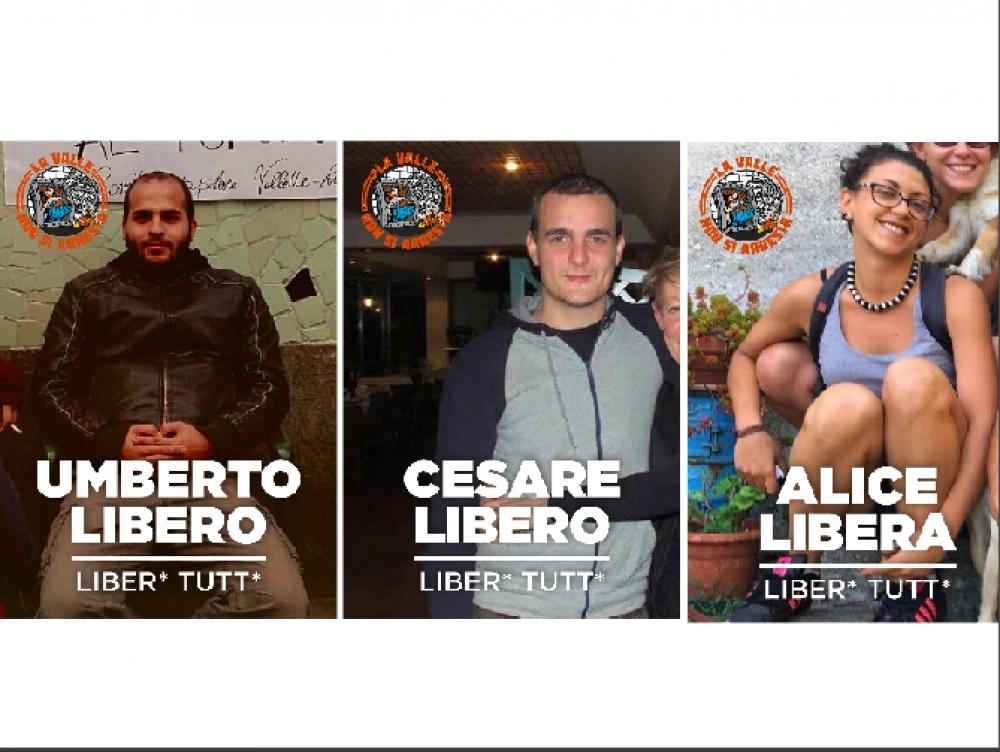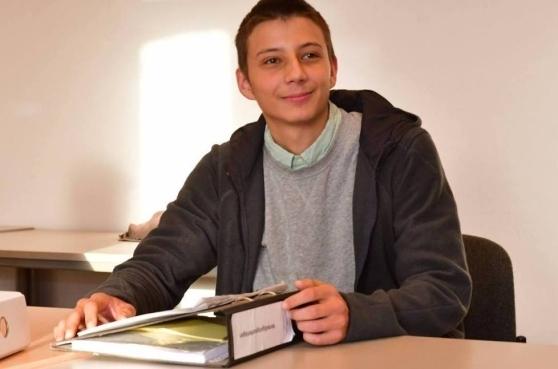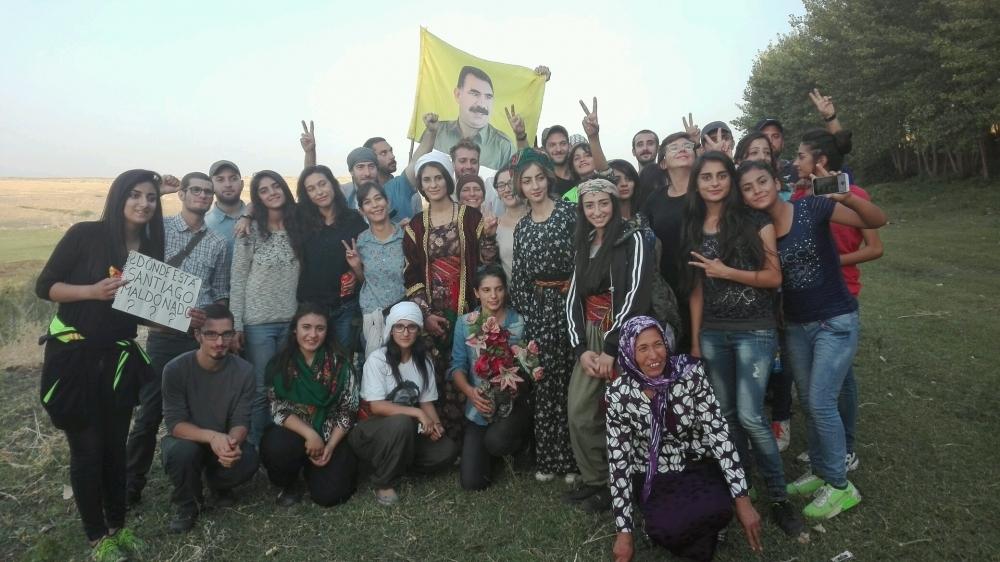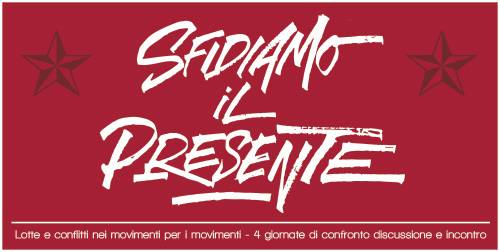
***
Defy the Present! (Call)
Struggles and conflicts in the movement and for the movements
With an irregular, yet steady, rhythm, the latest years definitely exposed how the promise of a world able to regulate by itself the labour market and the production and reallocation of resources, was betrayed. After decades of a substantially uncontested hegemony, the neoliberal ideology creaks. An age gleams on the verge of a nervous breakdown, a whole civilization is suspended and held on an abyss. Crisis, recession and reorganization define the unstable and tense background of the global present time, dotted by the progressive growth of systemic violence; in order to reproduce a command which is increasingly rapacious and destructive of lives and environments at the same time. A scenario with far-reaching causes and recent developments, within which power balances are continuosly recombining themselves, still failing to manage to find systemic stabilities.
Many kinds of conflict cross the social fabric of the territories we are living in, showing us that we are not all in the same boat – much to the chagrin of those who affirmed the necessity of rowing together. A heterogeneous kaleidoscope of struggles, forms of refusal, fields of dispute and contrast – sometimes explicit, sometimes underground, latent and potential – defines an unformed space of potentialities, in order to open up disruptions in our age. These social tendencies – in the present lack of magnetic forms able to group them together and of forces able to completely release their energies – are still contained within boundaries that are to be also searched in the idiosyncrasies and in the shortcomings of political antagonist capacity. Nevertheless, inside this magma, the latest years also produced – within such a daily movement – hundreds of activists and militants that are courageously growing in the struggles and the clash, generously doing their best and daring whereas it is necessary.
It is starting from this character of still confused features – from the struggles and practices of resistance and solidarity that define themselves in the territories – that the sincere search emerges, and the need of building a new promise for collective redemption comes forward. In the absence of run-of-the-mill truths, of models and of given solutions, it is however clear how the conditions of possibility – in order to make this promise able to establish and materialize itself – can only happen starting from the principle of contrast. Even the organizations that operate in the Europe-province on the government framework and on that of an increasingly battered democracy (by proposing a demand of reform of capitalism – from Syriza to Podemos), are forced to produce their political challenge on the ground of disruption; and, in these very cases, to assess the impossibility of positive outcomes, of possible transitions within the forms of political representation. Every hypothesis of systemic reorganization, being it ineluctably played inside the iron cage that defined itself around the crux of debt and finance, configures itself as colonization and exploitation of the whole life.
It is inside – and starting from – this mess of problems that a question binds us together. Which are the conditions, which are the methodologies and the practices we must know how to impose, in order to find again a strength of ours – a partisan and collective one – able to stand today (in the perspective of an overturing of the balances of power) the class clash and the attack against entire generations? In order to be able to move in the search for the answers to such questions, it is increasingly necessary to start from a two-fold verification: on one hand there is the issue of how to evade, circumvent, exceed and tear down the limits that the struggles have shown in the latest years – being aware that many new territories have to be explored; on the other hand, we have to take note about how the testing of meetings and agreements starting from the struggles are the inescapable starting point – in order to wipe out solitude, giving a renewed strenght and trust to social subjectivities. Precious and complex experiences have to meet together, debate, question their own assumptions, mix up and enrich a common wealth of knowledge and practices built on a tenacious incompatibility, in order to open a field of possibilities for new processes of movement.
In the age of the crisis, we need to put in the spotlight of a possible and evolving common debate the themes of the construction of conflict, of its legitimacy and duration, of the social entrenchment and organization of a partisan movement, of the new forms of social activation and of research of exposing new rising subjectivities, preventing the counterparty’s agendas or the trite rituals of the autumnal event from shaping their developments. We need to map the fault lines that gleam on our part of the world, in our class, and build new forms of political intervention. It is starting from those who recognize themselves in the urgency to think, organize and practice a sincere challenge to our time that, within an open and all to be explored proposal, we are building a space of discussion, gathering and debate in Rome from September 24 to 27, 2015; one that could be an appointment, in order to test forms of synchronization of the beats of social conflict.
***
A Charter to Defy the Present
Neoliberalism produces all over the world more and more inequalities, injustice and segregation, wars for control and exploitation of resources. An increasingly aggressive and pervasive capitalism annihilates social bonds, commodifies and devastates territories and lives, inflicting poverty and exploitation on us. The Present is narrated as an inescapable destiny, whereas millions of people are increasingly and necessarily urged to question that, and to overturn it into a time of possibilities, rather than waiting for empty promises of change to suddenly rain down from Heaven. Now it is time to act, to take our destiny into our hands, and to make sure that our own lives become a threat against the system.
Based on these premises, starting from the ongoing struggles and forms of resistance, we bring forth a challenge against Neoliberalism, which in Italy is now embodied by the Renzi model and by the Democratic Party – the Party of the Nation.
We want to challenge racism and social division, and to recompose our side through metissage and conflict. In order to take back what has been subtracted from us, we want to experiment new forms of struggle, against all processes of impoverishment exclusion and expropriation of the territories, as well as new frontiers of protagonism and social self-organization.
Healthcare, education, housing, labour, access to goods and services represent potential grounds for social activation, where it is possible to ignite important frontiers of social conflict, taking into account territorial specificities and actual needs: a multifaceted, direct and powerful collision between INCOME and POVERTY.
Such a process must emerge from the very factories of exploitation, and live in the streets of our peripheries. Those are places where composite social groups gather, and youngsters, migrants, workers, and variegated subjectivities express their irreconcilability through individual behaviors, which should be turned into collective rage and conflict to be further broadened to the mass level and generalized.
It is no longer enough to demand or claim. On the contrary, it is necessary to enact diversified practices of struggle: sabotages, blockades, strikes, pickets, occupations, new forms of re-appropriation of income and life in the present time. We need to free ourselves from the blackmail of debt, to impose payment self-reduction, to refuse to pay for the access to health services, for unjust taxation, for rents and bills, for medical tickets, for the university fees, for food, for access to culture and to all the goods and resources that are necessary to live a full and dignified life today. Let’s strive in order to wrest off what belongs to everyone of the dirty hands of financialization and the market; let’s take back what is ours.
A new generation and a new throb must push their way through, in order to declare their refusal, to affirm their happiness, and to open spaces and paths of liberation.
We bravely want to bring back the possibility of a radical transformation of the existing. Likewise the migrants who refuse to succumb to the Fortress Europe borders and walls, all of us are determined to liberate ourselves from blackmail, control and exploitation, and to contend, inch by inch, minute by minute, the territory and time to an increasingly estranged and arrogant power.
We will never think of having absolute truths in our pockets. On the contrary, we believe that, in the current and complex age it is necessary to be constantly available and ready to call our certainties into question. We need to bring, with our struggles, the desire of a new assault on Heaven to life, and to nurture a new collective dream of daily strives and conflicts, of new explorations and stronger experimentations.
We are fully aware that confronting power and the authorities today means to be ready to run the risk, but whatever it takes, with our heads held high, we want to play it thoroughly.
***
Report from the closing plenary assembly
We propose an account, which was written during the assembly, trying to define a text that collects the suggestions that emerged from the various interventions, instead than recording the single reports. Thus starting from an element of general overview of the discussion, in order to move to set some common cruxes – some invariants that built a pattern of discussion – and ending by pointing at the ongoing battlegrounds and the possible perspectives.
The debate began around a mood that aimed to open a space of discussion for a new militancy and new conflicts – starting from the struggles which arose in the last years. A space of discussion that assumes the limits of the latter as a starting point; not as excuses for lack of action but with a tension to exceed, break and overcome them.
We start from a challenge that was led against us by the organized 1%, which means a violent devalorization of lives in the first place. How is it possible, then, to find tools of collective organization, in order to accept and overturn this challenge? In order to suggest some answers to this question, it is necessary to meet to have a more resounding voice; in order to ripple the flat water of non-fulfillments and build adequate forms of conflict – not only out of need of defending, but of really triggering a process of transformation of society. Revamping outside the potentialities of the actual struggles: we need not to stop at what we do already have, at the inadequacies in regard to the potential conflict. Believing that there is no run-off-the-mill revolutionary subject, but infinite possibilities to intercept different forms, it is necessary to start thinking about a temporal background of permanent conflict to be established on the territories – but also on wider levels, too. Therefore, starting from a shattered social reality, it is necessary to build together some capacities, in order to not materialize them on a single day of struggle but on a process. On a non-linear temporality within a permanent crisis as a style of governance, one being able to set a “here and now” – by remaining aware that, very often, we attribute to the capital some powers it actually lacks. Thus focusing on its vulnerabilities.
The urgency and the need to build an autonomous temporality of social conflict, even in front of an unstable scenario, sets itself on these assumptions. We are witnessing the depletion of the model of institutional left and reformism, the end of the spaces of negotiation, that goes hand in hand with an acceleration of the processes of expropriation of our lives – which is embodied today in Italy by the Renzi-model. A system which is made by costs which are dumped on us without giving anything back, that yet it is not an impervious juggernaut. In this scenario, the possibility of us expropriating, in turn, means and resources in order to enrich a strength from our part emerges. The need of a partisan and collective organization that identifies the fields of the possible clash.
From here a challenge to the present arises, as a common possibility reasoning about the features of class hate that the poors can produce, against who forces us to sub-live. Doing it without any sectarian vision, by producing otherness as a risk and a value, and by accepting fluxes and energies that move within the society. Imagining differences as unique, without any acquiescence to pre-set patterns. Developing an ability to amaze ourselves and the others, entering in a permanent exchange with poverties and territories, fighting the assimilation to the Renzi-model and the Party of the Nation.
Thus developing a hypothesis of recomposition, one impossible to reduce to compliance with relationships of domination; with the courage and the will of becoming a center of common organization, able to seize chances, make politicity and opposition emerge, conceive a framework of possibilities about struggles to be measured on a perspective, on a wide gaze. To find points of accumulation and disruption, without being content and trying to imagine further, by standing on the peaks of conflict and trying to generalize and carry them out. Building infrastructures and knowledge able to make steps beyond, within an antagonist waiting time as tension of research of possible disruptions, of leaps to be built starting from a widespread increase of the intensities of the conflicts and of the forms of organization. Finding and revamping a courage that also clashes with a repression that hits so many comrades, to which the assembly addresses a complicit greet. Looking for disruptions not as adventurism, but as the need to develop forms of recognition also towards those who do not manage to understand where to address their own rage. Within this projection, it becomes decisive to be able to constantly perceive the daily struggles as a risk, bringing back an impression of possibilities that does not live on the sensitivity and the rethorics of imagining a new world as it does on the legitimacy of the tools of appropriation and resistence.
Therefore, it is decisive to become a credible option against the enemy that here today dresses the clothes of the Renzi model. To structure forms of organization where the latter is to be intended in the first place as a tool, as forms which are useful in order to bring back the challenge. A reflection about how defining a standing of social conflict starting from managing to get results, about how building tools that could revamp grassroots work; in order to have new capacities upon which to bring back a challenge which is not only political, but that it is built on a material ground.
Present traces of a conflict to be built
Some common features, some invariants crossed the various interventions. Beginning with the assumption that new space can only be opened starting from a framework and a possibility of opposition, clash and conflict. Starting from there it is strategic to consider the possibilities of transformation looking to those who need struggle as a possibility, to the people that are on the same side of us. A part which is opposed to another, that must be able to show strength. In the lack of certainties, a trait of experimentation in the action is fundamental, by retaining the attitude to seize the possibilities of disruptions, and not coming late in regard to the needs of the conflict. Thus developing a form of militancy that is always ready to seize the vibrations of the social context, standing within the contradictions, within the shit of the real. A strategic plan to develop, about the “here and now”, in order to seize shards of power starting from forms of being inside the social context. Starting from this background, in many interventions a recursiveness of the following cruxes ensued:
the need of raising our social cost, overturning the attempts of dumping the costs of crisis upon us;
Identifying in the existing constraints a starting point from which building communication among different processes;
Developing in the relationships between subjectivities and places new tactical positionings, able to address the forms of populism and the composite framework of the forms of refusal;
Experimenting with differences, yet conceiving the existence of a place where they can find a common ground, the one of class struggle and of the barricade;
Find a temporality and a gaze opposing the continuous production of emergencies and shocks;
Starting from the real contradictions, within the swift transformations of the capital and of the classes that rapidly change conflicts, with the ability of being agile in front of a mobile capital;
Identifying an element of recomposition in the material needs, yet looking to the comeback of class struggle;
Being able to suggesting political campaigns concurrently with a inclination to seize the opportunities within a potentially explosive situation – that for the time being is only given as a great confusion, yet in the presence of deep splits;
To be up to an arrogance by the power that today materializes as an attack from the top against the bottom.
Starting from this criteria, a pattern was proposed, a field of tension organized around three focal points: language, temporality and conflict. Language to be intended as a research within a new emerging composition, aimed to make a real possibility a powerful one. By engaging a reality which is shaped by capital, with our own tools of thinking and operating on the territories, in which regard there is a need of building our levels of reflection and action. The construction of a possibility, to not be simply given as rallying around a political proposal, but as a continuous experiment of focalization of energies. A research that must start from the need of a simple language, an issue that mimics the problem of organization, i.e. of the relationships that are produced among those who mean to overturn their own condition.
The temporality of that pole to be understood within the intensity of that effort to liberate ourselves from the oppressions, expropriations and contradictions that cross us. An intensity to be developed in order to gain what we do need in relaunching an hypothesis of class struggle within a temporality that is not just determined by the meeting of organizations. On the contrary, it has to be decisively looked for elsewhere, by finding a standard in the daily processes. And whereas the capital builds a time without remembrance, it is necessary to track elements of possible antagonist subjectivity. The elements of territory, of entrenchment, of a struggle which is far from rhetoric forms insert themselves in this framework. That is, processes of territorialization as a temporality of the movements in which a disruption has to be set forth: a language of transformation that must entrench itself into daily life. Finally, the element of the conflict as common mark within the social backgrounds emphasized as a probable collapsing point of the new upcoming global crisis was reported. In this regard the relationship among subjects to be developed far from involving education or assistance, has to find a pace to be developed in the example that shows the possibility of disruption as a fact, not as a word. In other words, identifying in the gap between the existing and its potential development the space to be conquered, for example by taking into consideration the most debated issue of metissage – whose seeds are already growing, but whose perspective is a stake to be developed.
Terrains of intervention and viable exploration
The debates, developed during the meeting, have indicated multiple terrains of intervention as well as numerous lines of tension to focus on, to connect and to exacerbate. A plurality of contradictions repeatedly pop up in different territories, and pinpoint the necessity to intertwine the paths and to combine the struggles; those knots also urge us to intercept the availability to collective answers, which we need to inquire, stimulate and experiment, of those who endure the austerity.
The matters of class composition and struggle have often emerged as key elements to further develop by revamping and transforming them as well as by exploring new open frontlines in the present. Therefore, we need to speak with people hit by the austerity and to spot terrains fostering “NOs”,while being aware that latent rage as well as irreconcilable behaviors and an unexpressed diffuse social willingness to demand, to wrest and to win, already exist. We should also change our priorities and situate them in a different context as well as recognize new starting points within a minefield of social conditions being on the verge of explosion. In other words, it is important to reach the core of the knots we wish to unravel by first grasping the tendencies within the class, and all incompatible behaviors we notice in the outskirts, in schools, in universities and so on, which we perceive as embryos of a great struggle to implement. We must not surrender to discouragement; we should conversely intend the present as a time to develop new skills, being aware that crucial struggles, such as the No Tav and that for the right to housing, leading to significant progress for social movements, are not going to happen anytime soon. Nonetheless, we cannot wait for the next Wave, most likely in vain. We should, in fact, find the seeds of conflict in every context of everyday life. Briefly,the potential fields of intervention emerged during the debates are summarized below, not in a hierarchical order:
Field 1: Labor/capital (wage) conflict
Struggles in the logistics sector have demonstrated how a subject, reluctant to rise up,has mobilized by recurring to organizational skills, which build mixed and combative social groups in the territory, rather than being pushed by an“outer” solidarity mechanism. The rebellious workers have chosen to cooperate with unionized structures and militant collectives to develop their struggles, starting from practical objectives, while concurrently aiming at the affirmation of their dignity as a fortifying and unifying terrain. The fight for higher wages has been able to put capitalist accumulation mechanisms in contradiction and to speak up upon the city, undergoing a capitalist transformation linked to the circulation of commodities. Therefore,we need to revamp the tool of strike by meaning it as a vehicle to spur conflict and to connect the social needs of the exploited scattered through the metropolis. Based on what happened in the last few years, we should turn the general strike in the logistics sector into a terrain where to experiment new forms of social aggregation.
Field 2: Income
While facing a general impoverishment, we need to overcome our weaknesses and to start from the soundness of the past struggles in order to create new ties among multifarious sources of conflict, able to intertwine, not to put in opposition to each other, different battlegrounds such as the claims for better wages, welfare and the fulfillment of people needs. Here in Italy, we should be able to interweave the fights against the worsening of labor regulation,against the increasing control over the employees at work, against the Jobs Act, and against the adaptation of welfare to the Anglo-Saxon criteria, with a general recapture of income and other social needs according to mechanisms of territorialization. Moreover, the pressing issue of youth unemployment is a key matter to scrutinize and to decode as a terrain of exploitation, where we should experiment viable forms of organization and repossession. Since the governance uses the matter of income as a tool of social pacification, by issuing a sort of “charity” in return for control and extra-work, in opposition, we should rethink it as a field of repossession, as a resource to lead more dignified lives, as a fight back against the debt economy.
Field 3: The Peripheries
The peripheries were built as social and geographical contexts. The first aspect,referred to as “social peripheralization”, is related to the ongoing social exclusion, to the planned escalation of human cast-offs, to the growth of emerging groups of poor, marginalized, misfits, jailed and homeless,asylum-seekers and refugees. Those subjects, looking ugly, dirty and evil, are endowed with germs of dignity and potential conflict. On the other hand, we must inquire on how to intercept people’s disadvantage and to break their fears (of losing their stability, their identities, their roles and their roots). In other words, we need to intervene and reconnect to the old and new poor, to the insolvents and to all irreconcilable behaviors, mostly individual, which we must prevent from setting off a battle of the have-nots, now embodied by Salvini and his similars. In order to rise against “the state of emergency” as the norm for millions of people, we must recognize social uprisings (such as Rosarno and December 9 in Turin) as fields of opportunities. Moreover,we must consider the peripheries as portions of our territories, where to set off new forms of struggle, of social gathering and recognition, in order to bring a mass of conflicting people out of the income/poverty dichotomy.
Campo 4: Education
The education sector, from primary schools up to the university and the cruxes of lifelong learning, remains one of the strategic terrains for partisan conflict and organization. The “factories of education” to the crisis are spaces of construction, which did undergo a deep transformation in the last years. The university completed a cycle of restructuring, which has culminated with the emergence of the “university as a company” format that already harbors potential forms of disruption of social isolation within itself. Therefore, there are chances to overturn the broken promises and the forthcoming contradictions, and to magnify them without any further simplifications. For what it concerns the university context, many interventions have recognized the framework of the ISEE parameter reform as a space for testing new antagonistic practices within that specific environment, also recognizing it as a possible starting point to engage other social frameworks, well aware that there are no open frontiers but borders to be spotted and cracked. Moreover, during the debate, many speeches emphasized the importance of setting-off struggles in primary and secondary schools by promoting sabotage of Renzi’s “Buona Scuola” reform and of the Invalsi evaluation tests. October 2 has been suggested as the first mobilization date.
Campo 5: Housing
Struggles for the right to housing remain a crucial terrain for repossession and social opposition against the crisis, although new networks and modes of transformation should be experimented, Housing is a fertile field for a political reinterpretation of people’s needs, as long as it involves the resistance to evictions, from both rental and occupied houses, and to foreclosures, beside aiming at shaping new forms of conflict. A week of mobilization, named “The poor first!”, has been launched by the “Abitare nella crisi” network from October 10th through October 16th. The last day will be the most important, with the rally of protesters reaching Montecitorio Palace (the Chamber of Deputies) in Rome.
Campo 6: Migrants
The new forms of mobility, with their complexity and kaleidoscopic characteristics, feature a deed of inherent disruption of the rules, that endows them with the ability to transform reality. While trampling over the frontiers of Fortress Europe, in such experiences as the one occurred in Ventimiglia , and being aware that nowadays borders are spread everywhere, it is necessary to imagine how to build alliances and sound political proposals, starting from the incompatible behaviours of the migrants. It is also necessary to consider the framework of mobility in its intimate connection with the present forms of labour, and to consider the residency permit, the article 5 of Housing Plan and the city residence status as terrains where conflict should be revamped and enhanced. Moreover, a non-negotiable and direct opposition against the new forms of fascism and racism deceptively presented as options of top-down management of migrant fluxes. The necessity of building forms of support to the resistance of Kobane and ways to sanction the Turkish government policies – getting past the isolated interventions of single organizations, in order to put them together on a wider scale – was also discussed.
Campo 7: Urban Battleground
The theme of the territory, of the city and of the metropolis is one of the guidelines starting with forms of struggle can be organized. This composite and differentiated form of definition of places to be red through the lens of urban character, or better of a process of urbanization as a wide element, connecting implosions and explosions, within a single patchwork: among woods, valleys, working-class neighborhoods, infrastructures and the destruction of the territories starting from the great works, from the TAV high-speed railway to the drillings that concern seas, countryside and metropolitan levels alike. The above mentioned theme of the working-class neighbourhoods and of the peripheries and that gap between territories that are hierachized by the capital and processes of territorialization, of mestizo spaces to be built, returns here. Then the urban framework is to be imagined as a constitutive field of conflict, of possible secession, of construction of other geographies, of search for practices of interruption of the capital flows and new utilization of the space. A field to attack, to wrest from a capital and a governmental rule that are increasingly less interested to local development, or able to be its proposers.
Campo 8: Welfare
The wide terrain of the restructuring of welfare is another of the levels of intervention and exploration to be activated. How to connect labour in social services, in healthcare, in the sheltering services with social demands and needs that are increasingly expelled from the costs that the State bears and redefines in the private sector or in the exclusion; how to imagine new forms of autonomous social reproduction starting from the gap that is presented by the neoliberal redefinition of the State; how to constitute a terrain from which the endogenous reproduction of the class may countervail the unavoidable destruction of the contemporary capitalist forms…all these questions are open on a space of conflict to test.
www.sfidiamoilpresente,org
Ti è piaciuto questo articolo? Infoaut è un network indipendente che si basa sul lavoro volontario e militante di molte persone. Puoi darci una mano diffondendo i nostri articoli, approfondimenti e reportage ad un pubblico il più vasto possibile e supportarci iscrivendoti al nostro canale telegram, o seguendo le nostre pagine social di facebook, instagram e youtube.













